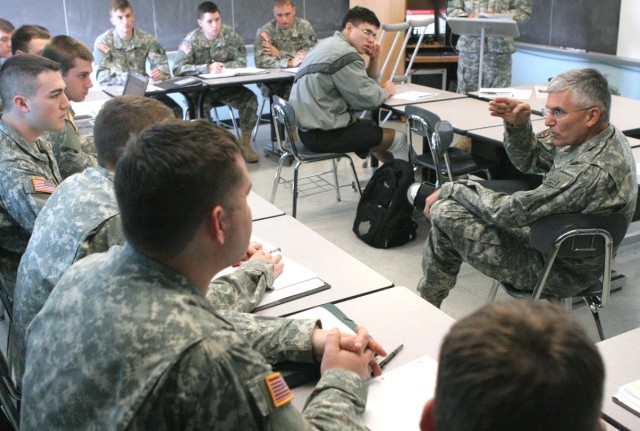
WEST POINT, N.Y. (Army News Service, April 26, 2007) - The Army's top-ranking officer traveled to West Point April 19 and spent two days sharing his initiatives with future leaders.
Gen. George W. Casey Jr., who replaced Gen. Peter J. Schoomaker April 10 as the 36th chief of staff of the Army, came to the U.S. Military Academy to share his vision of keeping the Army moving toward the distant future.
"It's not about me," Gen. Casey said. "It's about keeping the Army on track to 2020. It's to give the next chief (of staff of the Army) and the chief after that the Army they need to succeed."
The Georgetown graduate - whose father, Maj. Gen. George W. Casey Sr., was a 1945 USMA graduate - said he understands the importance of West Point and what the academy provides the Army in strong leadership.
He shared his high expectations for West Point with staff and cadets, telling them he plans to make the academy the Army Center of Excellence for Ethics and Values.
"What I'm seeing is a lot of very smart folks here who have some time to reflect and think about the hard issues (that have occurred, such as those at Abu Ghraib) and they can contribute largely to the Army," Gen. Casey said.
"We will make West Point the Center for Excellence for Ethics and Values ... It'll take a couple of weeks to work out the methodologies, but I'm convinced. The idea feels so right to me that we're going to go ahead and do it," he said.
Gen. Casey is also looking to increase the Army's active-duty end strength to 547,000 Soldiers over the next three to four years. His other initiatives include enhancing the quality of support to Soldiers and their Families to preserve the strength of the force; maintaining the continuity and momentum of modernizing the Army; completing the transition of the Reserve component to an operational force; accelerating change in leader-development programs; and adapting the Army's institutional polices, programs and procedures to support an expeditionary Army at war.
Cadet First Captain Jonathan Nielsen said he was awed by the 36-year Army veteran, who spent the last 2 1/2 years as the commander for Multinational Force-Iraq.
"I was very impressed by how respectful and appreciative he was of all of the cadets, and not only the cadets, but young Soldiers in general," Cadet Nielsen said. "He told us it is a tough battle that we're in, and our leadership and everything we're doing while we are here will be used - whether it's academic, military or physical."
Cadet Nielsen, who served three years in the infantry before arriving at West Point, said he likes the chief's vision of continuing the move from a heavy mechanized force to a lighter, more modular one. That force, Nielson said, can fight at the brigade level and is what he'll see as a platoon leader next year.
"To see the Army as the same machine, whether it's this year or 10 years down the road, and keep pushing it in that direction will only make us better," Cadet Nielsen stated. "Gen. Casey sees the large picture. He has great ambitions for not only improving the Army as an organization, but also improving the Army for the individuals who serve."
(Eric S. Bartelt writes for the U.S. Military Academy's "Pointer View.")

Social Sharing